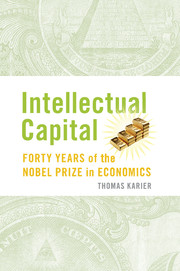Book contents
- Frontmatter
- Contents
- Preface
- Economic Nobel Laureates
- 1 An Economic Prize
- 2 Free-Market Economics
- 3 Micro: The Chicago School
- 4 Stock Market Casino
- 5 More Micro
- 6 Behaviorists
- 7 Keynesians
- 8 Classical Revival
- 9 Inventors
- 10 Game Geeks
- 11 General Equilibrium
- 12 A World View
- 13 Numbers Guys
- 14 History and Institutions
- 15 Reshaping the Prize
- Notes
- Index
- Frontmatter
- Contents
- Preface
- Economic Nobel Laureates
- 1 An Economic Prize
- 2 Free-Market Economics
- 3 Micro: The Chicago School
- 4 Stock Market Casino
- 5 More Micro
- 6 Behaviorists
- 7 Keynesians
- 8 Classical Revival
- 9 Inventors
- 10 Game Geeks
- 11 General Equilibrium
- 12 A World View
- 13 Numbers Guys
- 14 History and Institutions
- 15 Reshaping the Prize
- Notes
- Index
Summary
Eight Nobel Prizes have been awarded for contributions to game theory, although the father of game theory, the brilliant Princeton mathematician John von Neumann, was not among them. He died at the age of fifty-four, twelve years before the first economic prize was awarded. What von Neumann did was to apply the concepts of mathematics with its formal axioms and proofs to the analysis of simple but abstract games. In mathematics, games have a very precise definition. They are presumed to involve players, two or more, and a payoff, gains or losses, with some choice over possible actions. One of von Neumann's first proofs, published in 1928, involved finding a solution to the problem of two players trying to minimize their maximum losses. In this game, players review all of their options with the objective of choosing the strategy that has the smallest possible loss. Von Neumann was able to “prove” mathematically the conditions necessary for a solution to exist, the so-called minimax theorem.
From this initial insight, von Neumann explored other variations with more players and less certainty until he had enough different examples to write a book, The Theory of Games (1944), co-authored with Princeton economist, Oskar Morgenstern. With that publication, modern game theory was born, setting the stage for other mathematicians to explore variations of these simple games.
If anyone else had invented game theory they would have been celebrated for this single, impressive achievement.
- Type
- Chapter
- Information
- Intellectual CapitalForty Years of the Nobel Prize in Economics, pp. 193 - 220Publisher: Cambridge University PressPrint publication year: 2010



